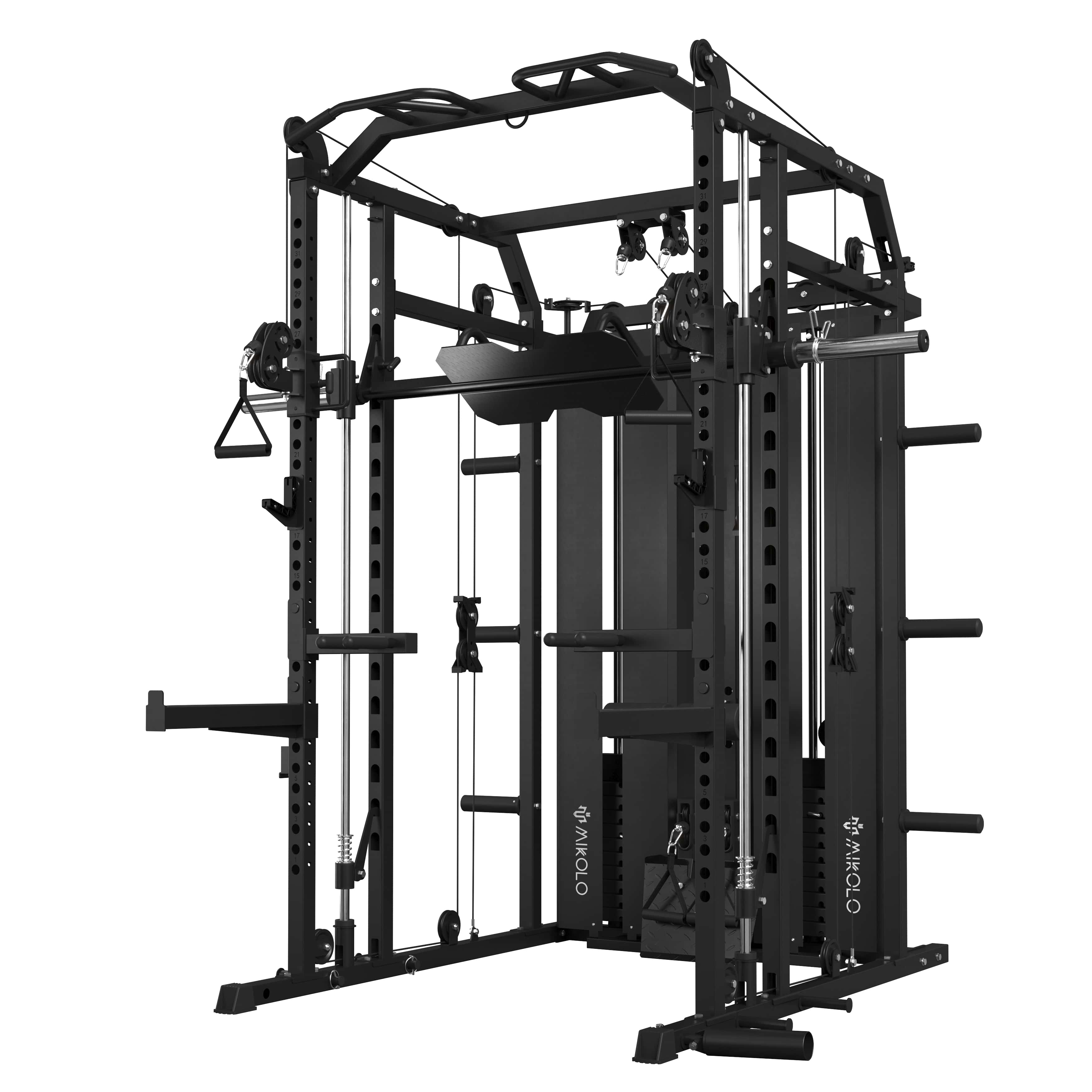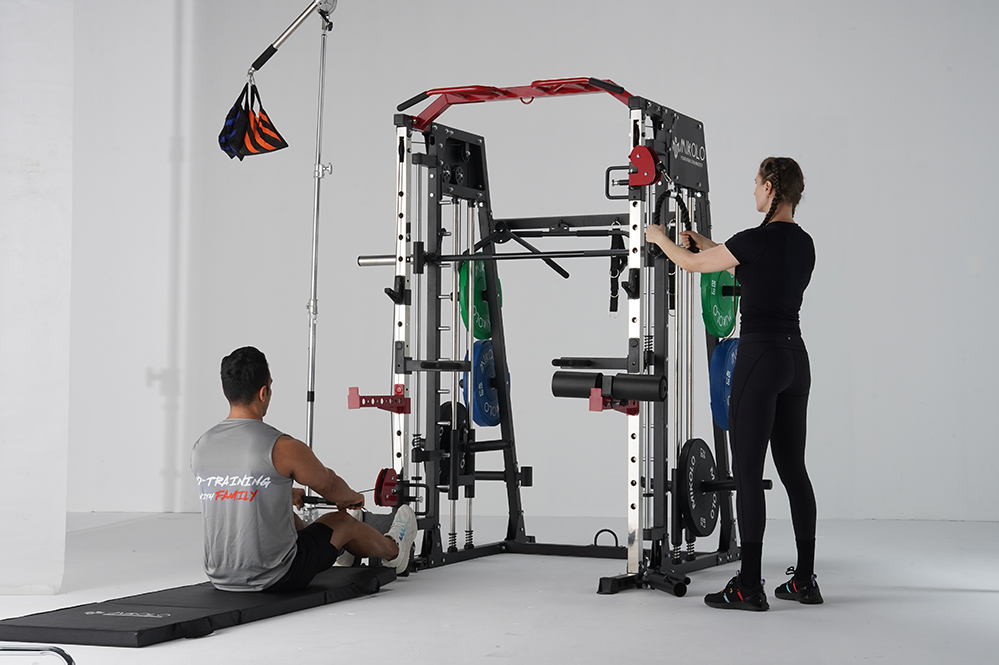When setting up your home gym, choosing the right equipment is crucial. Among the wide choice, two machines often stand out: the Functional Trainer and the Smith Machine. Each has its unique benefits, and understanding their differences can help you make an informed decision that aligns with your fitness goals. In this basic comparison, we'll break down the key points of these two popular machines, helping you decide which one deserves a place in your home gym.
What are Functional Trainers and Smith Machines
Before learning the details, it's essential to understand what each of these machines is and what they offer.
Functional Trainer: A versatile cable machine that provides a wide range of exercises. With adjustable pulleys and cable systems, it allows you to target multiple muscle groups, perform isolated exercises, and mimic natural daily movements. This makes it a go-to piece of equipment for a dynamic, full-body workout.
Smith Machine: A staple in many commercial gyms, the Smith Machine offers a more controlled lifting experience. It features a barbell fixed within vertical tracks, allowing for guided movement. This setup is particularly beneficial for exercises like squats and bench presses, where maintaining proper form is critical.
What are the differences between Machines?
When it comes to exercise variety, the Functional Trainer takes the crown. Its adjustable cables and pulleys provide endless possibilities, enabling you to perform exercises that mimic real-life movements and improve coordination and core strength. Whether you're doing bicep curls, tricep extensions, or lat pulldowns, the Functional Trainer offers a comprehensive workout that can target any muscle group.

On the other hand, the Smith Machine, while versatile in its own right, is somewhat limited by its fixed barbell path. It's perfect for exercises that require stability, like squats and bench presses but doesn't offer the same range of motion as a Functional Trainer. However, its space efficiency is a significant plus, especially if your home gym has limited room. A Smith Machine typically occupies less space than a full free-weight setup, making it a viable option for those with smaller workout areas.
Safety and User-Friendliness
Safety is a top priority, especially for beginners or those working out alone at home. Both machines score well in this regard, but they do so in different ways.
Functional Trainer: The cable system provides controlled resistance, reducing the risk of injury. Adjustable weight stacks allow for gradual progression, making it ideal for users of all fitness levels. However, mastering proper form is essential to avoid muscle imbalances.
Smith Machine: With its fixed barbell path, the Smith Machine offers built-in safety features that are particularly beneficial for heavy lifting. The barbell can be locked in place at any point during the exercise, providing an added layer of security. This makes it an excellent choice for those lifting heavier weights without a spotter.
Cost and Long-Term Durability
Investing in home gym equipment is a significant financial commitment, so it's crucial to consider both the upfront costs and long-term durability.
Functional Trainer: Typically more expensive due to its versatility and built-in weight stacks. However, its ability to replace multiple machines could make it cost-effective in the long run. Choosing a high-quality brand with a solid warranty can ensure durability and longevity.
Smith Machine: Generally more affordable, especially models designed for residential use. While it may require additional equipment for a complete workout (such as a bench or free weights), a well-maintained Smith Machine can last for years, offering excellent value for money.
Space Saving Tips
For those with limited space, making full use of every square inch of your home gym is essential. Both machines have their space-saving advantages:
Functional Trainer: Wall-mounted models or those with integrated components like pull-up bars and accessory storage can help conserve space. Despite its versatility, a well-designed Functional Trainer can fit neatly into a compact area.
Smith Machine: Its design is inherently space-efficient, particularly when paired with a multi-functional bench. Some Smith Machines also come with additional features, such as lat pulldowns or low row attachments, further enhancing their utility without requiring extra space.
All-in-one Machine
If you're struggling to choose between a Functional Trainer and a Smith Machine, why not consider a combination unit? These all-in-one machines offer the versatility of a Functional Trainer with the controlled movements of a Smith Machine, making them a better choice for those who want a comprehensive workout experience without sacrificing space.
For example, the M4 Smith Machine provides all the features you need for a full-body workout in a compact footprint. It's an ideal solution for home gym owners looking to maximize space and functionality.
Final Thoughts: Which One Is Right for You?
Ultimately, the best piece of equipment for your home gym depends on your individual fitness goals and space constraints.
Choose a Functional Trainer: if you're looking for versatility, full-body workouts, and a machine that can grow with your fitness journey. It's perfect for those who enjoy dynamic exercises and want to target various muscle groups with one piece of equipment.
Opt for a Smith Machine: if your primary focus is on strength training with heavy weights, and you prefer the added safety of a guided barbell path. It's also a great choice for those with limited space who want a reliable and straightforward lifting experience.
Consider an All-in-one Equipment: if you want the best of both worlds—versatility and safety—in a single, space-efficient package.
No matter which option you choose, investing in high-quality equipment that aligns with your goals is the key to a successful home gym setup. With the right tools, you'll be well on your way to achieving your fitness goals from the comfort of your own home.











































Leave a comment
This site is protected by hCaptcha and the hCaptcha Privacy Policy and Terms of Service apply.